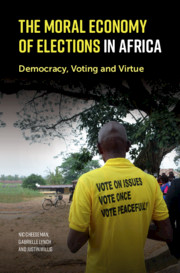Book contents
- The Moral Economy of Elections in Africa
- The Moral Economy of Elections in Africa
- Copyright page
- Dedication
- Contents
- Figures
- Tables
- Acknowledgements
- Abbreviations and Glossary
- Introduction: Writing African Elections
- 1 Towards a Moral Economy of Elections in Africa
- 2 Elections, States and Citizens
- Part I Promoting Civic Virtue
- 3 National Exercises
- 4 The Eyes of the World Are upon Us
- 5 Creating Democrats
- Part II The Moral Economy in Action
- Appendix 1: Research Methods
- Bibliography
- Index
4 - The Eyes of the World Are upon Us
The Aspirations and Limitations of International Election Observation
from Part I - Promoting Civic Virtue
Published online by Cambridge University Press: 15 December 2020
- The Moral Economy of Elections in Africa
- The Moral Economy of Elections in Africa
- Copyright page
- Dedication
- Contents
- Figures
- Tables
- Acknowledgements
- Abbreviations and Glossary
- Introduction: Writing African Elections
- 1 Towards a Moral Economy of Elections in Africa
- 2 Elections, States and Citizens
- Part I Promoting Civic Virtue
- 3 National Exercises
- 4 The Eyes of the World Are upon Us
- 5 Creating Democrats
- Part II The Moral Economy in Action
- Appendix 1: Research Methods
- Bibliography
- Index
Summary
This chapter discusses international observers and their efforts to improve the quality of elections. Elections are profoundly performative. They demand an audience, and since the late colonial period that audience has been in part an international one. Generations of political leaders, and civil servants, have sought to emphasise the disciplinary function of elections by reminding the public that “the eyes of the world” are upon them. The institutionalization of international election observation over the last thirty years has turned this gaze back upon the state itself: requiring and expecting behaviour in line with international norms. In the African context, though, international election observation has attracted more criticism than acclaim. We argue that this is because observers face two fundamental problems. The first is that observers’ very presence is part of the state effect of elections, conferring legitimacy, yet observers can only report critical opinions after the fact. This links to a second problem, which is that as observers respond to the numerous pressures they face they risk undermining their own credibility, especially among opposition supporters. Especially where elections have generally failed to deliver political change, this undermines the capacity of observers to encourage citizens and parties to play by the rules of the democratic game.
Keywords
- Type
- Chapter
- Information
- The Moral Economy of Elections in AfricaDemocracy, Voting and Virtue, pp. 142 - 174Publisher: Cambridge University PressPrint publication year: 2021

